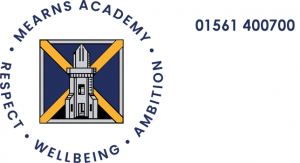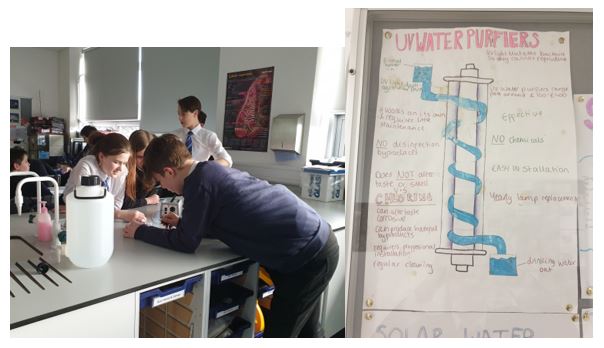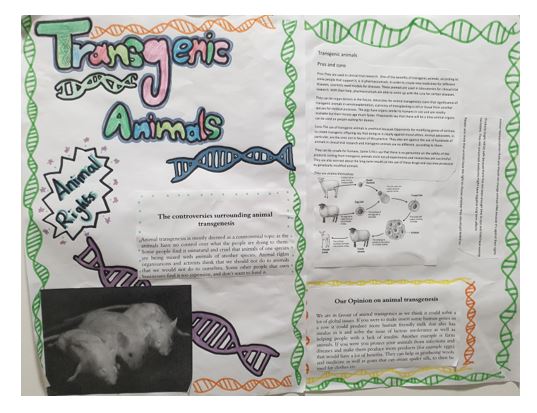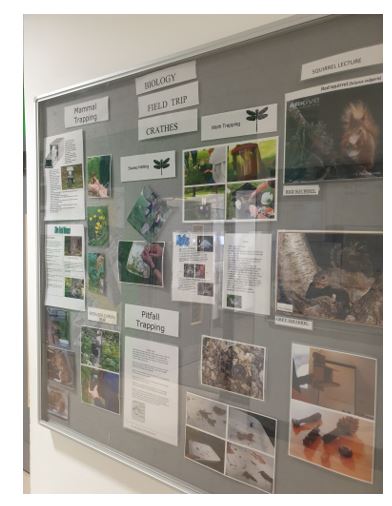BGE Science
In S1 and S2 all pupils take all sciences (Biology, Chemistry and Physics). Each class is taught one unit of each science up until Christmas and then a second unit from each science from January until the summer holidays.
In S1 the units are:
- Introduction to Science
- Biology (Cells, Reproduction and Science and The Environment)
- Chemistry (Matter and Everyday Chemistry)
- Physics (Energy and Light and Heat)
In S2 the units are:
- Biology (Body Systems and Plants)
- Chemistry (Chemical Combinations and Useful Chemicals)
- Physics (Electricity and Forces, Space and Sound)
In S2 we also have a 4th period of science called ‘Science Skills’ where pupils learn to apply practical and problem-solving skills to new challenges. All lessons are as practical as possible and involve a variety of activities including taking part in experiments, making posters, writing notes and answering questions.
We have a science club in the faculty which provides an opportunity for pupils who love science to meet up once a week to try extra fun experiments we don’t have time for in class.
In S3 We Cover:
All lessons are as practical as possible and involve a variety of activities including taking part in experiments, making posters, writing notes and answering questions.
Biology:
Pupils learn about the biology of the cell in terms of key structures, chemical reactions and organism. The detail covered prepares pupils for the National 5 course in S4.
Units taught are:
- Cell Structure
- DNA
- Enzymes
- Microbes
- Respiration
Chemistry:
Pupils learn about the basic principles that underpin how chemicals interact and important chemicals and their reactions in society. It provides the groundwork necessary for National 5 Chemistry.
Units taught are:
- Introducing chemistry
- Atoms, Ions and Molecules
- Fuels and Energy
- Metals
Physics:
Pupils learn about some of the key principles and contexts which underpin the physics courses in senior phase.
Units taught are:
- Speed, Distance and Time
- Forces
- Electricity
- Waves and Radiation
Science and Society:
This course is designed for pupils who are likely to progress to the NPA course in Science and Health rather than take N5 in any science in S4. The course contains a little of each science taught in separate units.
Units covered are:
- Human Health
- Metals
- Applications of Science.
Senior Phase
Biology
National 4:
Aim of Course – To develop knowledge and understanding of Biology and its role in society and the environment. To develop experimental skills, planning and analytical thinking. The ability to problem-solve, investigate and communicate information.
- Unit One – Cell Biology
- Unit Two – Multicellular Organisms
- Unit Three – Life on Earth
To achieve the National 4 course, learners must pass all of the required unit assessments plus the Added Value unit which takes the form of a researched and written assignment (200-400 words).
National 5:
Aim of Course – To develop a deeper understanding of biology and a deeper understanding of its role in scientific issues and in society and the environment. To develop experimental skills, planning and analytical thinking. The ability to problem-solve, research and communicate information effectively.
- Unit One – Cell Biology
- Unit Two – Multicellular organisms
- Unit Three – Life on earth
Assessment – A two-section, 100 marks exam paper (2.5 hours) – 25 multiple choice questions and 75 marks in short answer questions. A researched and written assignment (500- 800 words) worth 25 marks.
Higher:
Aim of Course – To develop and apply knowledge and understanding of biology, its applications and its impact on society. To develop analytical thinking, scientific evaluation, problem solving and planning skills. to use and understand scientific literacy to communicate ideas and issues, and to develop skills for more advanced learning in biology.
- Unit One – DNA And The Genome
- Unit Two – Metabolism And Survival
- Unit Three – Sustainability And Interdependence
Assessment – 3 hour exam (120 marks). 25 multiple choice questions and 95 marks in extended response questions (including 1 essay). There is also an assignment worth 30 marks.
Higher Human:
Aim of Course – To develop and apply knowledge and understanding of biology, its applications and its impact on society. To develop analytical thinking, scientific evaluation, problem solving and planning skills. to use and understand scientific literacy to communicate ideas and issues, and to develop skills for more advanced learning in biology.
- Unit One – Human Cells
- Unit Two – Physiology And Health
- Unit Three – Neurobiology And Immunology
Assessment – 3 hour exam (120 marks). 25 multiple choice questions and 95 marks in extended response questions (including 1 essay). There is also an assignment worth 30 marks.
Advanced Higher:
Aim of Course – Advanced Higher is SQA’s highest level of National Course and is very demanding. Advanced Higher extends students’ knowledge and skills beyond Higher. Students will face new academic and personal challenges, requiring them to develop their knowledge and abilities and to think and work independently.
- Unit One – Cells And Proteins
- Unit Two – Organisms And Evolution
- Unit Three – Investigative Biology
Assessment – 3 hour exam (100 marks). 20 multiple choice questions and 80 marks in extended response questions (including 1 essay). There is also an assignment worth 30 marks.
Chemistry
National 4:
Aims of the Course – This course will develop pupils understanding of scientific method and include theoretical work and practical experimental work. The course will help to develop a curiosity and understanding of the environment and the material world. In addition, pupils will be able to demonstrate a secure knowledge and understanding of the big ideas and concepts of chemical sciences.
- Unit One Chemical Changes And Structure
- Unit Two Nature’s Chemistry
- Unit Three Chemistry In Society
Assessment To achieve the National 4 course, learners must pass all of the required unit assessments plus the Added Value unit which takes the form of a researched and written assignment [200-400 words].
National 5:
Aims of the Course – This course will develop pupils understanding of scientific method and include theoretical work and practical experimental work. The course will help to develop a curiosity and understanding of the environment and the material world. In addition, pupils will be able to demonstrate a secure knowledge and understanding of the big ideas and concepts of chemical sciences.
- Unit One – Chemical Changes And Structure
- Unit Two – Nature’s Chemistry
- Unit Three – Chemistry In Society
Assessment:
A two-section, 100 marks exam paper (2.5 hours) – 25 multiple choice questions and 75 marks in short answer questions.
A researched and written assignment [500- 800 words] worth 25 marks.
Higher:
Aim of Course – The course is designed for students who wish to continue their study of chemistry beyond Credit level and who may wish to progress to Advanced Higher. As such the Higher course could form the first year of a two-year post National 5 level.
- Unit One – Chemical Changes And Structure
- Unit Two – Nature’s Chemistry
- Unit Three – Chemistry In Society
- Unit Four – Researching Chemistry
Assessment – 3 hour exam (120 marks). 25 multiple choice questions and 95 marks in extended response questions. There is also an assignment worth 30 marks.
Advanced Higher:
Aim of Course – This course provides insight into the underlying theories of Chemistry and develops the practical skills used in a chemical laboratory. The study of Chemistry at this level can make a major contribution to your knowledge and understanding of the natural and physical environment. You will have the opportunity to develop the skills of independent study and thought that are essential in a wide range of subjects and occupations. Advanced Higher Chemistry is particularly relevant if you wish to progress to degree courses, either in Chemistry, or in subjects in which Chemistry is a major component, such as medicine, chemical engineering or environmental science. The course also provides a sound basis for direct entry to chemistry related employment.
- Unit One – Inorganic Chemistry
- Unit Two – Physical Chemistry
- Unit Three – Organic Chemistry And Instrumental Analysis
- Unit Four – Researching Chemistry
Assessment – 3 hour exam (110 marks). 25 multiple choice questions and 85 marks in extended response questions (including 1 essay). There is also an assignment worth 30 marks.
Physics
National 4:
Aims of the Course – This course will develop pupils understanding of scientific method and include theoretical work and practical experimental work. The course will help you to develop a curiosity and understanding of the environment and the material world. In addition, pupils will be able to demonstrate a secure knowledge and understanding of the big ideas and concepts of chemical sciences.
- Unit One – Waves And Radiation
- Unit Two – Electricity And Energy
- Unit Three – Dynamics And Space
To achieve the National 4 course, learners must pass all of the required unit assessments plus the Added Value unit which takes the form of a researched and written assignment (200-400 words).
National 5:
Aims of the Course – This course will develop pupils understanding of scientific method and include theoretical work and practical experimental work. The course will you help to develop a curiosity and understanding of the environment and the material world. In addition, pupils will be able to demonstrate a secure knowledge and understanding of the big ideas and concepts of chemical sciences.
- Unit One – Dynamics
- Unit Two – Space
- Unit Three – Electricity
- Unit Four – Matter
- Unit Five – Waves
- Unit Six – Radiation
The written exam consists of 25 multiple choice and 110 marks worth of extended answer questions, over 2 and a half hours. This is scaled to 80% of the final grade. An assignment will be undertaken worth the remaining 20%.
Higher:
Aim of Course- The course is designed for students who wish to continue their study of chemistry beyond credit level and who may wish to progress to Advanced Higher. As such the Higher course could form the first year of a two-year post National 5 level.
- Unit One – Our Dynamic Universe
- Unit Two – Particles And Waves
- Unit Three – Electricity
There are two exam papers – paper 1 is 45 minutes and comprises 25 multiple choice questions and is worth 17% of the final grade; paper 2 is a 130 mark question paper lasting 2 hours 15, worth 63%. An assignment provides the remaining 20%.
Advanced Higher:
Aims of the Course- Advanced Higher is SQA’s highest level of National Course and is very demanding. Advanced Higher extends students’ knowledge and skills beyond Higher. Students will face new academic and personal challenges, requiring them to develop their knowledge and abilities and to think and work independently.
- Unit One – Rotational Motion And Astrophysics
- Unit Two – Quanta And Waves
- Unit Three – Electromagnetism
The final exam is a 3 hour paper worth 75% of the final grade. There is no multiple-choice component at this level. An experimental project comprises the remaining 25% of the final grade.



